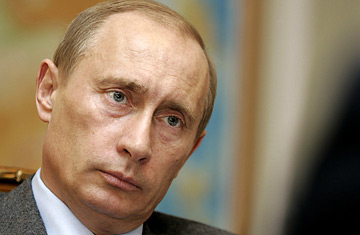
Russian President Vladimir Putin
Today's nuclear threat comes from "rogue" states such as Iran and North Korea that Washington claims may not be deterrable by the Cold War calculus of mutually assured destruction. That's why the U.S. is continuing to work on the missile shield system on which it has already spent about $100 billion. And U.S. officials can't figure out why, given Russia's proximity to Iran and Washington's willingness to actually share the technology with Moscow, the Kremlin keeps saying "Nyet!"
The spat spiked Wednesday when Secretary of State Condi Rice verbally slapped a top Russian general for saying that Moscow might have to aim some of its missiles at former fellow Warsaw Pact members the Czech Republic and Poland if they host U.S. missile-defense bases. Gen. Nikolai Solovtsov, head of Russia's strategic missile forces, had said Monday such targeting would be an option if those two nations agree to a U.S. proposal to base 10 interceptor missiles in Poland and a radar in the Czech Republic. "I think that was an extremely unfortunate comment," Rice said during a stop in Berlin. Unfortunate, perhaps, but hardly isolated. On Thursday, President Vladimir Putin announced he would suspend his nation1s compliance with a post-Cold War treaty limiting conventional arms in Europe, due in large part to the oozing eastward of the U.S. missile shield.
Defense Secretary Robert Gates, promoting the scheme among European allies (some of them skeptical as a result of Russian objections), sounded exasperated. "We've made a very forthcoming offer to partner with the Russians," he said Monday. "We've invited them to come see our interceptors at Fort Greely, Alaska. We've invited them to come see our radar in California. We've even offered, if appropriate, to co-locate radars with them and share data." All this, he said, had led to "some debate in Moscow about how to respond under the circumstances."
Joint Chiefs of Staff Chairman General Peter Pace visited Moscow a month ago and tried to convince his Russian counterpart that extending the U.S. system to European bases was intended to counter an expected Iranian threat, and would not weaken Russia's own nuclear deterrent. "The math and geometry is fairly straightforward and fairly basic," he said. "If the Russians were to fire a missile at the United States, the [U.S. interceptor] missile that's in Poland would not be able to catch the missile that was fired from Russia."
Air Force Lieutenant General Trey Obering, chief of the Pentagon's Missile Defense Agency, recently told reporters over breakfast that the Pentagon's mid-course interceptors ordain where in Europe the defense sites should be located. "We have to be far enough back to be able to engage these threats in their mid-course phase, and we also have to be far enough back that we can launch the interceptor, get it through its own boosting phase, to be able to kill the inbound missile," he explained.
The Russians, of course, view the notion of an Iranian missile strike against the U.S. skeptically, and wonder if the system isn't some kind of anti-Russian Trojan horse designed to kill Russian missiles. Obering dismisses that idea. "The Russians have hundreds of ICBMs and they have thousands of warheads," he noted. "We're talking about 10 interceptors, so that's not going to change the strategic balance between the two countries."
Instead of trying to intimidate its neighbors, Moscow should welcome the chance to work with the U.S. on missile defense, Obering said. "We have a combined interest in stopping this emerging missile threat," he said. "It's not the Russians that we're worried about — it's the Iranian missiles that we're worried about. There's thinking inside the Pentagon that Reagan's "Star Wars" plan so unnerved the Russians that they're still suffering from a Cold War hangover and ultimately might see the light and cooperate. But that's unlikely to happen so long as NATO encroaches further east toward the Russian frontier. Russians have always feared invasions from the west, and it appears that is how some key members of Moscow's security elite view the impending European missile bases.
